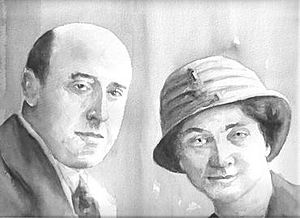George Shepherd, 1st Baron Shepherd facts for kids
Quick facts for kids
The Lord Shepherd
|
|
|---|---|

George Robert Shepherd, 1st Baron Shepherd and his wife, Ada
|
|
| Chief Whip of the House of Lords Captain of the Honourable Corps of Gentlemen-at-Arms |
|
| In office 18 October 1949 – 5 November 1951 |
|
| Prime Minister | Clement Attlee |
| Preceded by | The Lord Ammon |
| Succeeded by | The Earl Fortescue |
| Deputy Chief Whip of the House of Lords Captain of the Queen's Bodyguard of the Yeomen of the Guard |
|
| In office 6 July 1949 – 18 October 1949 |
|
| Prime Minister | Clement Attlee |
| Preceded by | The Lord Walkden |
| Succeeded by | The Lord Lucas of Chilworth |
| Lord-in-waiting Government Whip |
|
| In office 14 October 1948 – 6 July 1949 |
|
| Prime Minister | Clement Attlee |
| Preceded by | The Lord Lucas of Chilworth |
| Succeeded by | The Lord Kershaw |
| Member of the House of Lords Lord Temporal |
|
| In office 28 June 1946 – 4 December 1954 Hereditary Peerage |
|
| Preceded by | Peerage created |
| Succeeded by | The 2nd Lord Shepherd |
| Personal details | |
| Born |
George Robert Shepherd
19 August 1881 |
| Died | 4 December 1954 (aged 73) |
| Political party | Labour |
| Spouse | Ada Newton (m. 1915) |
| Children | 2 |
George Robert Shepherd, 1st Baron Shepherd (born August 19, 1881 – died December 4, 1954) was an important British politician from the Labour Party. He was also a member of the Privy Council, a group of advisors to the British monarch.
Contents
Early Life and Beginnings
George Robert Shepherd grew up in Spalding, Lincolnshire. His father was a tailor. George started working at a young age as an assistant to a cobbler in Bradford. This experience led him to join a trade union, which is a group that helps workers. In 1903, he also joined the Independent Labour Party (ILP), a political group that later helped form the Labour Party.
From 1908, he worked full-time for the ILP in the Midlands. After that, he became an agent for the Labour Party in Dundee. An "election agent" helps manage a political campaign for a candidate. Later, he moved to Blackburn to work for another important Labour politician, Philip Snowden.
During the First World War, George Shepherd chose not to fight. He was a conscientious objector, meaning he believed war was wrong and refused to join the military for moral reasons.
Political Career Highlights
In 1920, George Shepherd became a Labour Party organizer for the London and Southern areas. He moved up in the party, becoming the Assistant National Agent from 1924 to 1929. Then, from 1929 to 1946, he served as the National Agent. This meant he was in charge of all the Labour Party's local organizers across the country. This was a very important role, especially during the time when the Labour Party won a huge election victory, bringing Clement Attlee to power as Prime Minister.
George Shepherd also played a key role during World War II. When Prime Minister Sir Winston Churchill asked the Labour Party to join a special wartime government, George Shepherd helped negotiate the terms of this agreement. This showed how trusted and important he was within the Labour Party.
Joining the House of Lords
On June 28, 1946, George Shepherd was given a special title and became Baron Shepherd. This meant he became a member of the House of Lords, which is the upper house of the British Parliament. At the time, there were not many Labour Party members in the House of Lords, so his appointment was significant.
After joining the House of Lords, he served in the Labour government led by Clement Attlee. He held several important roles:
- He was a Lord-in-waiting from 1948 to 1949, which meant he was a government whip, helping to make sure Labour Party members voted in line with the government's plans.
- In 1949, he became the Captain of the Queen's Bodyguard of the Yeomen of the Guard. This role also meant he was the Deputy Chief Whip in the House of Lords.
- From 1949 to 1951, he was the Captain of the Honourable Corps of Gentlemen-at-Arms, which made him the Chief Whip in the House of Lords. As Chief Whip, he was responsible for the government's business and discipline among its members in the House of Lords.
- In 1951, he was also sworn into the Privy Council, a group of senior advisors to the monarch.
Family Life
In 1915, George Shepherd married Ada Newton. Ada was also very active in public life. She was a strong supporter of trade unions and worked hard for women's rights, especially fighting for fair wages for women. She received support from well-known Quaker families like the Cadburys and Rowntrees, who were famous for their chocolate and social work.
George and Ada had two children, a son and a daughter named Margaret. Margaret passed away in 2015.
Lord Shepherd passed away in December 1954, at the age of 73. His son, Malcolm, inherited his title and also became a very important Labour politician, holding many of the same government positions as his father.
 | William L. Dawson |
 | W. E. B. Du Bois |
 | Harry Belafonte |

